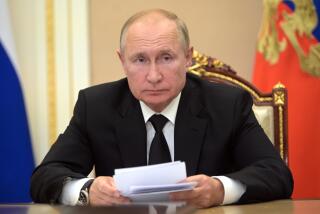Britain Won’t Send Chechen Back to Russia
- Share via
MOSCOW — In a blow to Russia’s bid to cast itself as a partner in the global war on terrorism, a British judge Thursday refused to extradite Chechen envoy Ahmed Zakayev, whom Russia has accused of kidnapping and murder in the breakaway republic.
The decision, which can be appealed, brought immediate condemnation from the Russian Foreign Ministry, which denounced it as “a serious blow” to Russia’s partnership with Britain, “especially in the field of anti-terrorist interaction.”
It was a potentially embarrassing ruling for President Vladimir V. Putin, who has sought to portray Russia as an ally of the U.S. and Britain in combating Islamic extremism, frequently comparing the suicide bombings, kidnappings and ambushes launched by Chechen rebels in Russia with Al Qaeda terrorist attacks against targets in the United States and Middle East.
Senior District Judge Timothy Workman dismissed claims brought by the Russian Federation and said he feared for Zakayev’s safety if he was handed over.
“I have come to the inevitable conclusion that if the [Russian] authorities are prepared to resort to torturing witnesses, there is a substantial risk that Mr. Zakayev would himself be subject to torture,” the judge said.
Human rights groups applauded the ruling, noting that Chechen prisoners have died in Russian and Chechen jails.
“Torture and ill treatment in Russian police cells, as well as the harassment of ethnic Chechens, are common, and as the representative of Chechen rebel leader Aslan Maskhadov, Mr. Zakayev would have been particularly vulnerable,” London-based Amnesty International said in a statement.
In Moscow, parliamentary deputy Sergei Kovalyov told the Interfax news service it was “absolutely obvious” that evidence against Zakayev had been obtained under torture. Kovalyov, an opposition politician and human rights activist, said the case, along with the recent arrest of former Yukos Oil Co. Chief Executive Mikhail Khodorkovsky, demonstrates that “extremely worrisome processes are taking place in Russia.”
Zakayev, a 44-year-old former stage actor, was named deputy prime minister of Chechnya under the government elected in 1997, and became Maskhadov’s envoy in peace negotiations after being injured in the early years of the Chechen war.
A new Chechen president, Akhmad Kadyrov, took office last month after elections heavily overseen by Russian troops, and Maskhadov is commanding a small number of guerrillas committed to ousting Russian forces from the war-battered republic.
Russian officials allege that Zakayev, who commanded rebel soldiers in southwestern Chechnya during the 1994-96 war with Russia, was responsible for the death of at least 300 Russian soldiers, the kidnapping of two Orthodox priests and other acts of “banditry.”
Zakayev has denied involvement in any terrorist acts.
“Today we got a fair decision by the courts which gives me the opportunity, and my friends, to continue the fight against this regime,” Zakayev said in London. “We can only claim complete victory when we can finish with this criminal regime of President Putin.”
The key testimony in the extradition hearing, which began in London’s Bow Street Magistrate Court last spring, came from Duk-Vakha Doshuyev, former director of security at the Chechen Ministry of Culture, where Zakayev worked. Doshuyev had been expected to be the key witness against Zakayev after a December 2002 interview on Russian television, shortly after his arrest in Russia, in which he declared that Zakayev had ordered the kidnapping of the priests.
Doshuyev stunned the court in September when he appeared instead on Zakayev’s behalf and said he had been tortured into making the statements. He said he was held in a pit for six days and beaten. “I had no other choice. I couldn’t take any more torture. Morning and night I was being beaten,” he told the court.
The hearing also focused on British Royal Prosecutor James Lewis, who represented the interests of Russian prosecutors seeking the extradition. Lewis rejected defense lawyers’ claims that the killings of soldiers claimed in the charges were not murder but part of “military operations” during a “war.”
“If we follow the logic of the defense, then the murders of British soldiers by North Irish militants were not murders,” the prosecutor told the court.
Russian officials have suggested that Maskhadov was involved in planning the October 2002 siege of a Moscow theater by armed Chechens, in which 129 hostages died, nearly all from a gas used by Russian police forces who stormed the theater.
Zakayev has contended that Maskhadov’s group has resisted calls for exporting the Chechen conflict, which resumed in 1999, to Russian targets outside Chechnya. Most Chechen analysts believe the more militant organization of warlord Shamil Basayev plotted the theater siege, and Basayev has claimed responsibility.
The United States in August designated Basayev an international terrorist whose actions were a “threat to national security,” and took action to freeze any funds belonging to his organization. There has been no similar U.S. action against Maskhadov or Zakayev.
In Moscow, Putin aide Sergei Yastrzhembsky called the ruling “a recurrence of the double-standard policy characteristic of the Cold War epoch, and an attempt to justify terrorism with fine but empty words.”
“There is no political persecution in Russia,” he said.
More to Read
Sign up for Essential California
The most important California stories and recommendations in your inbox every morning.
You may occasionally receive promotional content from the Los Angeles Times.













